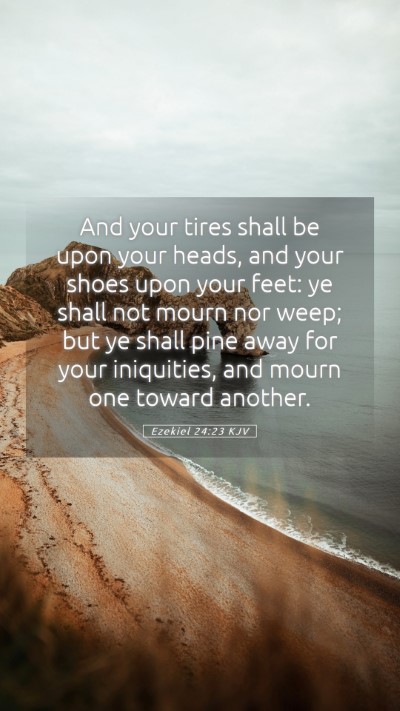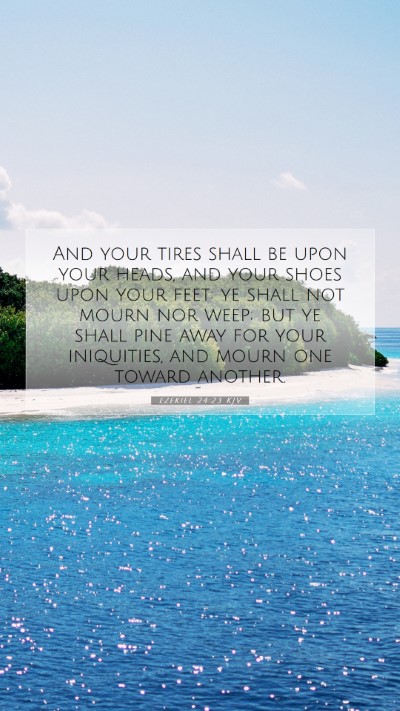Ezekiel 24:23 - Understanding the Verse
Bible Verse: Ezekiel 24:23
"And your tires shall be upon your heads, and your shoes upon your feet: you shall not mourn nor weep; but you shall pine away for your iniquities, and mourn one toward another."
Bible Verse Meaning and Interpretation
This verse from the book of Ezekiel reflects a powerful message about the consequences of sin and the judgment of God. In this chapter, Ezekiel is delivering a prophetic word regarding the fall of Jerusalem and the imminent devastation that the people will face due to their disobedience. The imagery presented is not just physical but deeply spiritual, illustrating a cosmos of sorrow interwoven with judgment.
Contextual Background
The context of Ezekiel 24 reveals that God is serving notice to His people through the prophet Ezekiel. The Israelites had continually turned away from God's commandments, and now, they were facing the dire consequences of their actions. Ezekiel's prophetic messages often left a vivid impact on the people, using dramatic symbolism to convey the gravity of their situation.
Commentary Insights
-
Matthew Henry:
Henry emphasizes that the people of Israel had reached a point of spiritual numbness. The command to not mourn or weep symbolizes God’s judgment, showcasing how their inner turmoil is related to their iniquities rather than the loss of earthly possessions. The 'tires' and 'shoes' represent their preparations to face the consequences of their sins without proper lamentation.
-
Albert Barnes:
Barnes interprets the phrase as indicative of a people who, despite their suffering, will not express their mourning traditionally. This reflects a hardened heart resulting from a relentless cycle of sin. The emphasis on not mourning implies that they should recognize the spiritual ramifications of their actions rather than merely their current plight.
-
Adam Clarke:
Clarke notes that the weariness of soul experienced by these individuals is a direct result of their iniquities. They would pine away not only for the sins they committed but also for the fellowship they lost with God. Clarke elaborates on the notion that chastisement can be a precursor to healing but also highlights that spiritual death can be more severe than physical suffering.
Spiritual Significance
Overall, Ezekiel 24:23 serves as a poignant reminder of the gravity of sin and the need for repentance. The refusal to mourn signifies a profound disconnect from God, where individuals face their due consequences yet remain unmoved at the cost of eternal separation from divine grace. This can be applied to contemporary believers who sometimes fail to recognize the severity of their spiritual dispositions.
Applying the Verse to Life
For individuals seeking Bible verse meanings and biblical exegesis, Ezekiel 24:23 encourages self-examination regarding one’s relationship with God and the seriousness of sin. Reflecting on this verse can inspire one to seek restoration through repentance and alignment with God’s will.
Cross References
- Lamentations 1:12 - Expresses the depth of sorrow for the fall of Jerusalem.
- Isaiah 22:12-14 - Conveys the Lord's call for mourning due to unrepentant sin.
- Jeremiah 14:2 - Highlights the state of mourning in Judah during times of hardship.


